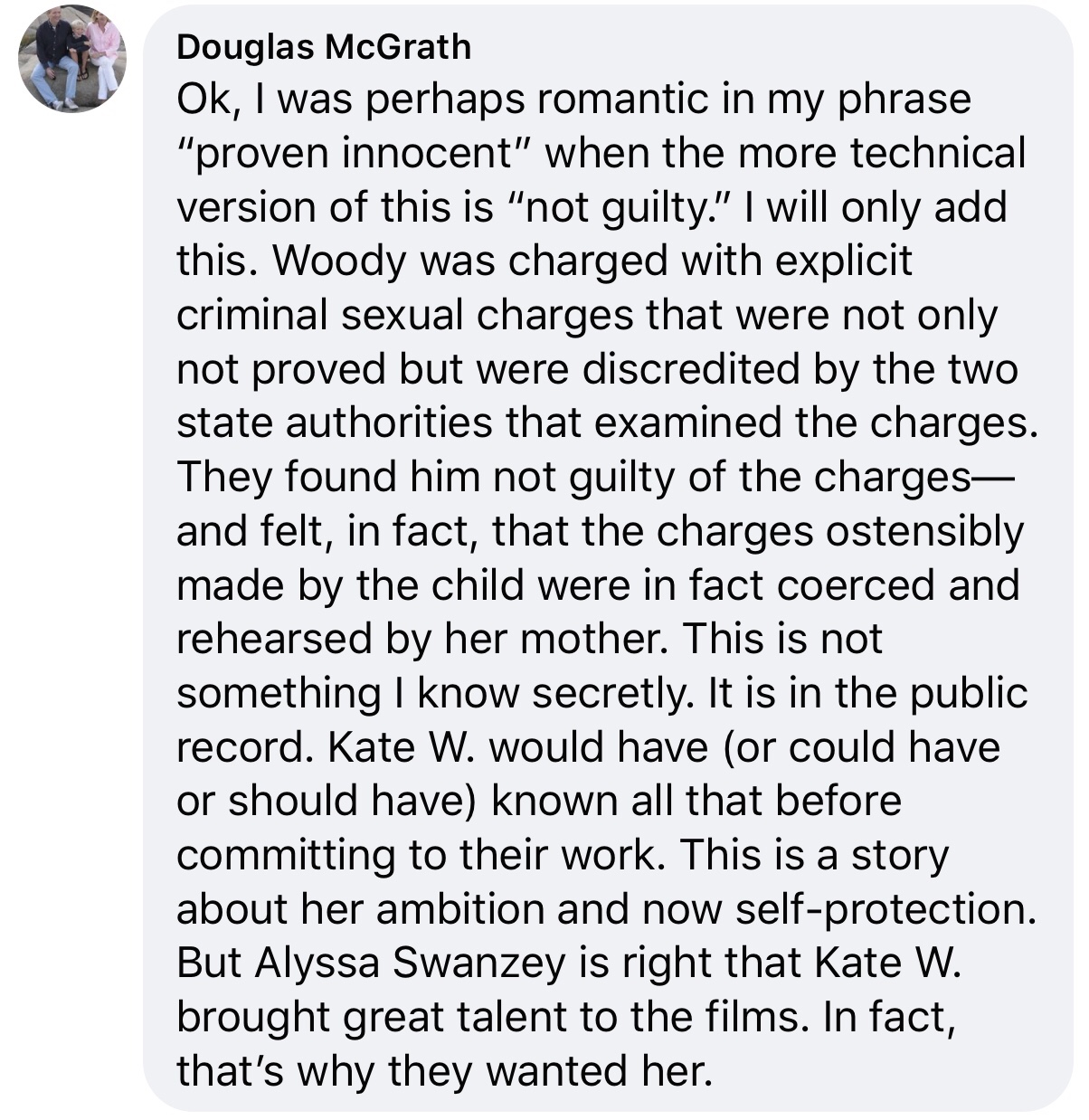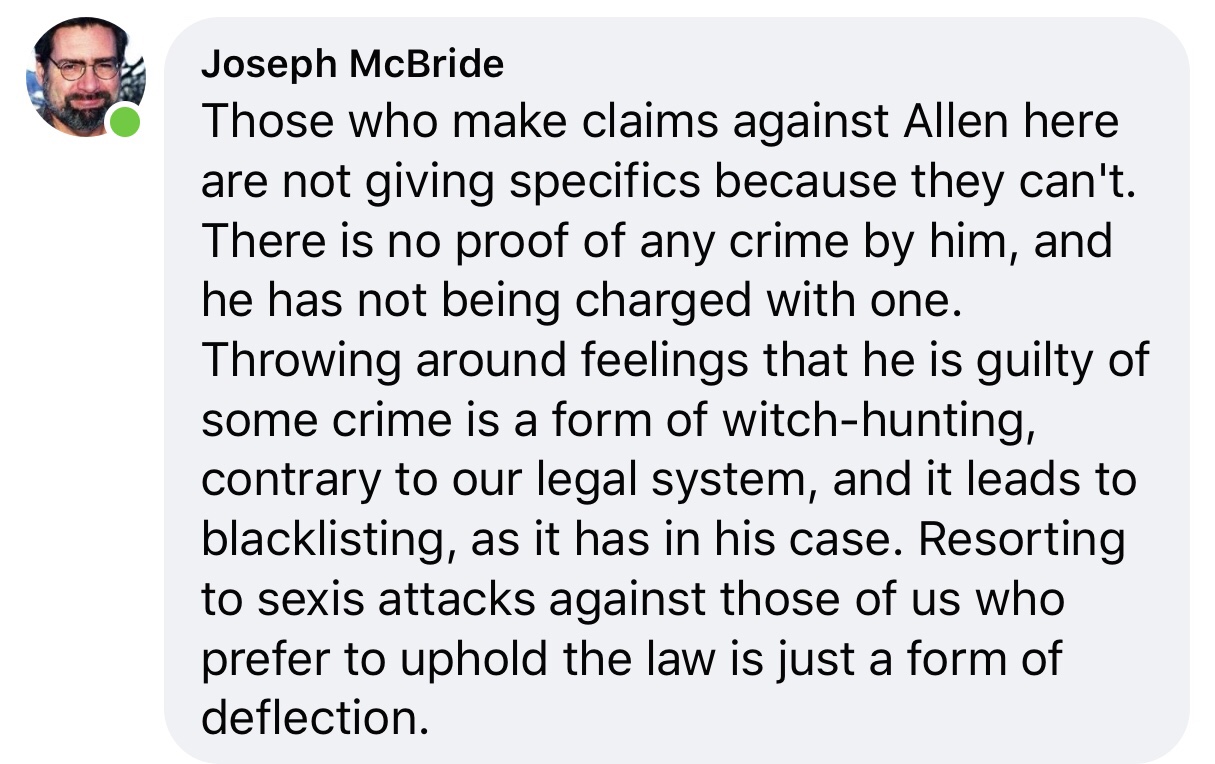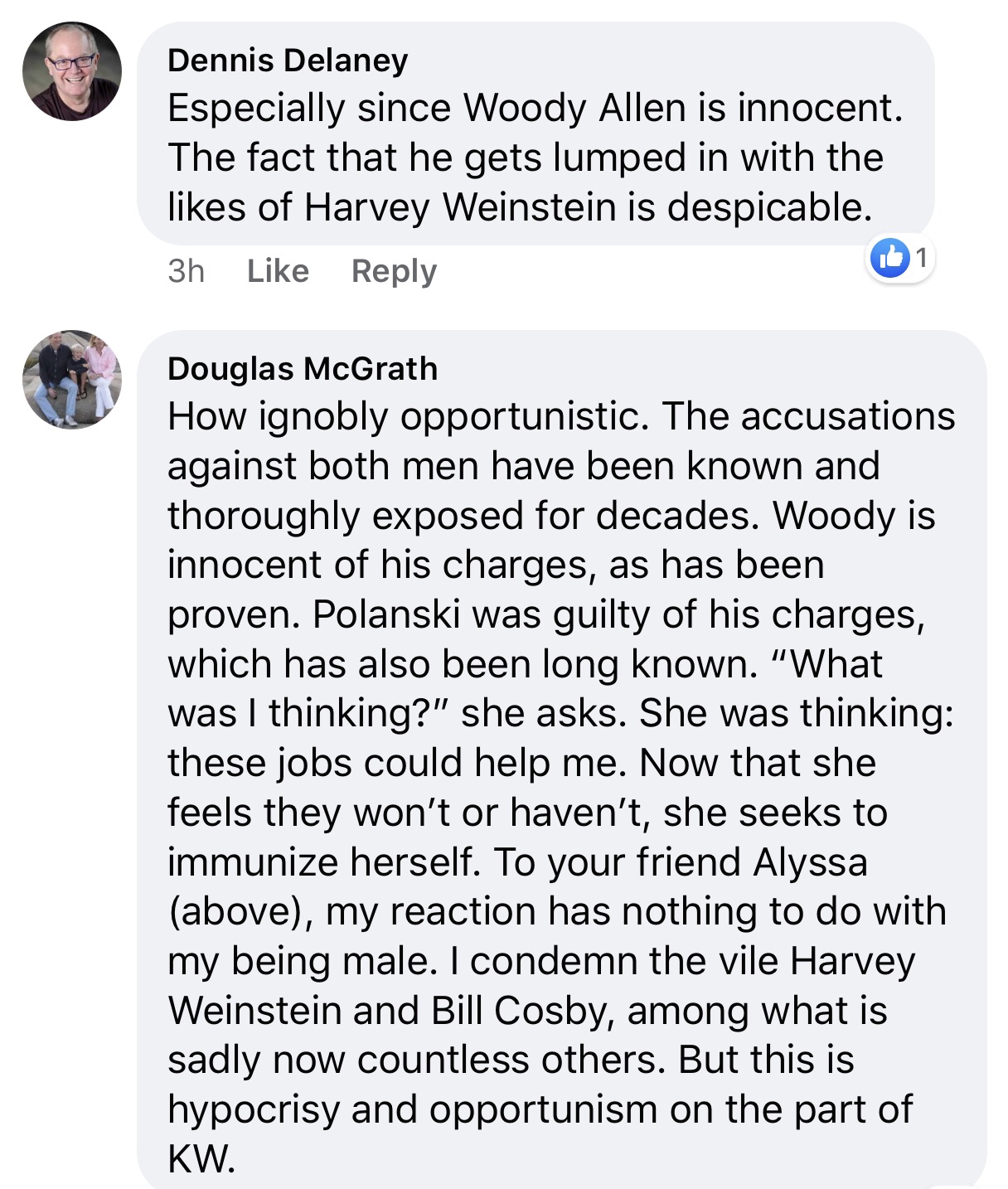Ammonite star Kate Winslet to Vanity Fair‘s Julie Miller: “It’s like, what the fuck was I doing working with Woody Allen and Roman Polanski? It’s unbelievable to me now how those men were held in such high regard, so widely in the film industry and for as long as they were. It’s fucking disgraceful.
“And I have to take responsibility for the fact that I worked with them both. I can’t turn back the clock. I’m grappling with those regrets but what do we have if we aren’t able to just be fucking truthful about all of it?”
In other words, having worked with Polanski in 201l’s Carnage, which was shot a year after Polanski’s controversial 2009 arrest in Switzerland in concert with a U.S. extradition attempt (or roughly a decade ago), Winslet has suddenly decided that this wasn’t cool, apparently because making Ammonite has strengthened her #MeToo convictions.
Obviously a little Johnny-come-lately but okay, that’s how she feels.
But to equate Polanski and Woody Allen in terms of alleged crimes and offenses is just forehead-slapping ignorant. Moreover, it was derelict of Miller not to ask Winslet about the mountains of evidence, indications and public statements that indicate Allen is completely innocent.
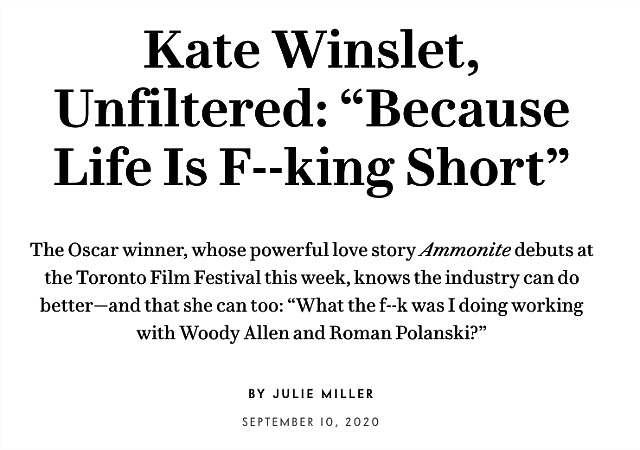
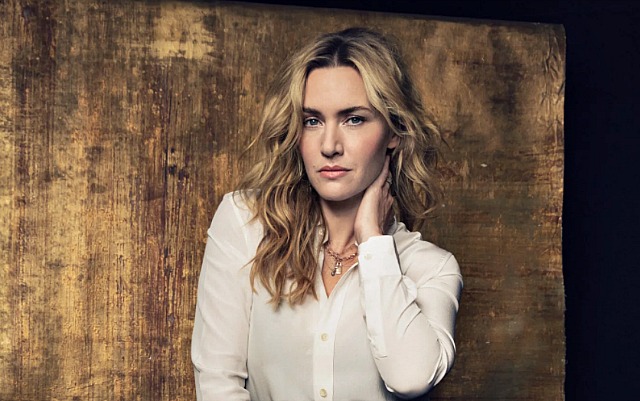
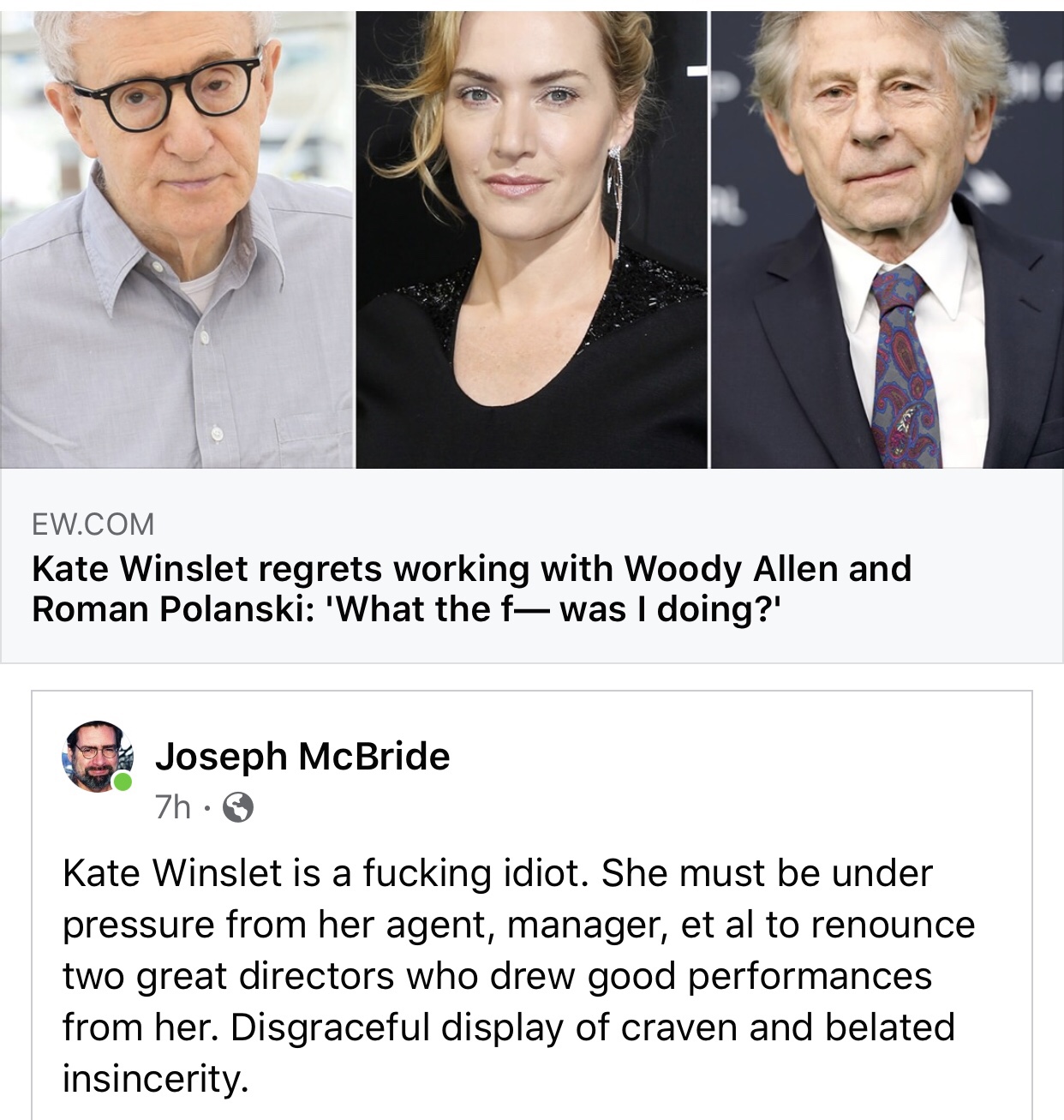
I’m so tired of having to refute kneejerk anti-Woody slander by obstinate or under-informed persons, but here, for what feels like the 28th or 29th time, is what any reasonable person would regard as the irrefutable truth of things:
(1) There is no evidence to support Dylan Farrow’s claim. But there’s a fair amount of evidence and ample indication that Mia Farrow, enraged by Woody’s romance with Soon-Yi Previn, made it all up to “get” Woody during an early ’90s custody battle, and as part of this determination coached Dylan to make the claims that she did. I happen to personally believe this scenario. There’s simply no rational, even-handed way to side with the “I believe Dylan Farrow” camp.
(2) If after reading Moses Farrow’s 5.23.18 essay (“A Son Speaks Out“) as well as Robert Weide’s “Q & A with Dylan Farrow” (12.13.17) and Daphne Merkin’s 9.16.18 Soon-Yi Previn interview…if after reading these personal testimonies along with the Wikipedia summary of the case you’re still an unmitigated Dylan ally…if you haven’t at least concluded there’s a highly significant amount of ambiguity and uncertainty in this whole mishegoss, then I don’t know what to say to you. There’s probably nothing that can be said to you.
(3) Excerpt from Yale–New Haven Hospital Child Sexual Abuse Clinic report (issued in 1993): “It is our expert opinion that Dylan was not sexually abused by Mr. Allen. Further, we believe that Dylan’s statements on videotape and her statements to us during our evaluation do not refer to actual events that occurred to her on August 4th, 1992.
(4) “In developing our opinion we considered three hypotheses to explain Dylan’s statements. First, that Dylan’s statements were true and that Mr. Allen had sexually abused her; second, that Dylan’s statements were not true but were made up by an emotionally vulnerable child who was caught up in a disturbed family and who was responding to the stresses in the family; and third, that Dylan was coached or influenced by her mother, Ms. Farrow. While we can conclude that Dylan was not sexually abused, we can not be definite about whether the second formulation by itself or the third formulation by itself is true. We believe that it is more likely that a combination of these two formulations best explains Dylan’s allegations of sexual abuse.”
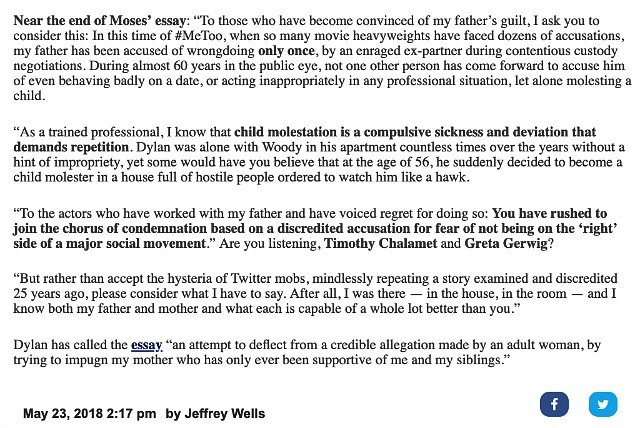
As for Polanski, here’s a portion of “Open Letter to Polanski Haters,” which I posted five months ago:
“Anyone can watch Polanski’s The Pianist, but no one in the U.S. and England can watch J’Accuse in a theatre, on a Bluray or even via streaming.
“Because certain persons believe that Polanski’s rep must be permanently tarred and feathered and therefore J’Accuse, too, must be buried or otherwise scrubbed from existence. Because of reputedly credible accusations of Polanski having behaved badly and perhaps even criminally with certain younger women in the ’70s and ’80s. And because the distribution community is terrified of what #MeToo-ers will say and do if one of their number would even consider streaming J’Accuse.
“Here’s the thing — Polanski the man is not the same thing as Polanski the artist. His depiction of awful or ghastly things in his films (he’s never explored Pollyanic fantasy and escapism) has never conveyed a corrosion or poisoning of his own spirit. He understands what goes, how it all works, who the good guys are. This is quite evident in The Pianist and J’Accuse. But the latter is nonetheless going to be buried for a long time to come, or so I’m told.
“Consider this passage from a 6.21.12 N.Y. Times article called “Good Art, Bad People“, written by Charles McGrath:
“In the case of the artist, badness or goodness is a moral quality or judgment; in the case of his art goodness and badness are terms of aesthetic merit, to which morality does not apply.”
